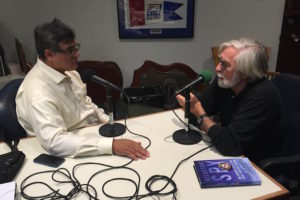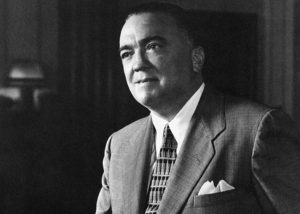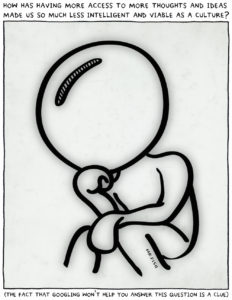The Character Assassin
Even as jurors pondered whether Vice President Cheney's former chief of staff should be convicted of lying about what the Bush administration did to smear one of its critics, there was Cheney accusing another adversary of doing the work of the terrorists.WASHINGTON — Even as jurors pondered whether Vice President Cheney’s former chief of staff should be convicted of lying about what the Bush administration did to smear one of its critics, there was Cheney accusing another adversary of doing the work of the terrorists.
The fabricate-and-smear cycle illustrated so dramatically during the case of I. Lewis “Scooter” Libby explains why President Bush is failing to rally support for the latest iteration of his Iraq policy. The administration’s willingness at the outset to say anything, no matter how questionable, to justify the war has destroyed its credibility. Its habit of attacking those who expressed misgivings has destroyed any goodwill it might have enjoyed. Bush and Cheney have lost the benefit of the doubt.
Yet Cheney has learned nothing and forgotten nothing. His latest demon is House Speaker Nancy Pelosi, whom he accuses of validating al-Qaida’s objectives.
“Al-Qaida functions on the basis that they think they can break our will,” Cheney told ABC News on Friday by way of explaining his earlier attack on the House speaker. “That’s their fundamental underlying strategy: that if they can kill enough Americans or cause enough havoc, create enough chaos in Iraq, then we’ll quit and go home.”
Cheney added: “And my statement was that if we adopt the Pelosi policy, that then we will validate the strategy of al-Qaida. I said it, and I meant it.”
No doubt he did, and those words illustrate the administration’s political methodology from the very beginning of its public campaign against Iraq. Back in 2002 and early 2003, it browbeat a reluctant country into this war by making assertions about an Iraqi nuclear program that proved to be groundless and by inventing ties between Saddam Hussein and al-Qaida that didn’t exist.
Then, once our troops were committed, anyone who had second thoughts could be trashed and driven back as a pro-terrorist weakling. The quagmire would be self-perpetuating: Once you checked in, you could never leave.
The evidence presented at Libby’s trial has demonstrated how worried Cheney was that this scheme could unravel. Thanks to Patrick Fitzgerald, the painstaking prosecutor, we know that Cheney was beside himself over former Ambassador Joseph Wilson’s July 6, 2003, New York Times Op-Ed article undercutting the administration’s claim that Saddam Hussein had sought nuclear materials in Niger.
Whatever the jury decides, Fitzgerald has amply demonstrated that Cheney directed Libby to destroy Wilson’s credibility, partly by leaking that his wife, Valerie Plame Wilson, was a CIA operative who had suggested Wilson was well qualified to investigate the claims in Niger. For Libby, Fitzgerald said in closing his case, Valerie Wilson “wasn’t a person. She was an argument, a fact to use against Joe Wilson.”
Libby-Cheney apologists have argued over and over that Cheney had a right to be angry because Wilson said that Cheney had sent him to Niger. But Wilson said no such thing. In his New York Times piece, Wilson wrote only that he had been “informed by officials at the Central Intelligence Agency that Vice President Dick Cheney’s office had questions about a particular intelligence report.” That was true.
The attack apparatus has now turned on Fitzgerald, whose record is that of a thoroughly nonpartisan prosecutor. Fitzgerald’s perjury rap against Libby, Cheney allies say, is a cheap attempt to criminalize politics.
Really? Here’s what Rep. Ileana Ros-Lehtinen, R-Fla., had to say about perjury: “Lying under oath is an ancient crime of great weight because it shields other offenses, because it blocks the light of truth in human affairs. It is a dagger in the heart of our legal system, and indeed in our democracy. It cannot, it should not, it must not be tolerated.”
Ros-Lehtinen made that statement not about Libby, but to justify the impeachment of Bill Clinton back in 1998. I have no idea where she stands on the Plame-Wilson case. But it’s certainly amusing that so many who were eager to throw Clinton out of office for perjury and obstruction of justice when he lied about sex are now livid at Fitzgerald for bringing comparable charges in a controversy over the rationale for war. Do they think sex is more important than war?
Whatever price Scooter Libby pays, the country is already paying for the divisive practices of a crowd that wanted to go to war in Iraq in the very worst way — and did exactly that. As a result, we confront the mess in Baghdad and the continued threat of terrorism as an angry, polarized nation.
E.J. Dionne Jr.’s e-mail address is [email protected].
© 2007, Washington Post Writers Group
Your support matters…Independent journalism is under threat and overshadowed by heavily funded mainstream media.
You can help level the playing field. Become a member.
Your tax-deductible contribution keeps us digging beneath the headlines to give you thought-provoking, investigative reporting and analysis that unearths what's really happening- without compromise.
Give today to support our courageous, independent journalists.





You need to be a supporter to comment.
There are currently no responses to this article.
Be the first to respond.